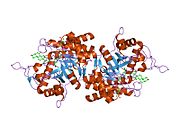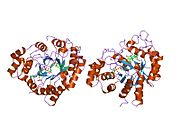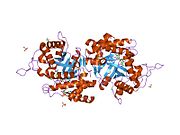AKR1C1
Appearance
Template:PBB Aldo-keto reductase family 1 member C1 is an enzyme that in humans is encoded by the AKR1C1 gene.[1][2]
This gene encodes a member of the aldo/keto reductase superfamily, which consists of more than 40 known enzymes and proteins. These enzymes catalyze the conversion of aldehydes and ketones to their corresponding alcohols by utilizing NADH and/or NADPH as cofactors. The enzymes display overlapping but distinct substrate specificity. This enzyme catalyzes the reduction of progesterone to the inactive form 20-alpha-hydroxy-progesterone. This gene shares high sequence identity with three other gene members, and is clustered with those three genes at chromosome 10p15-p14.[2]
References
- ^ Ciaccio PJ, Tew KD (1994). "cDNA and deduced amino acid sequences of a human colon dihydrodiol dehydrogenase". Biochim Biophys Acta. 1186 (1–2): 129–32. doi:10.1016/0005-2728(94)90144-9. PMID 8011662.
{{cite journal}}: Unknown parameter|month=ignored (help) - ^ a b "Entrez Gene: AKR1C1 aldo-keto reductase family 1, member C1 (dihydrodiol dehydrogenase 1; 20-alpha (3-alpha)-hydroxysteroid dehydrogenase)". PMID 1645.
{{cite web}}: Missing or empty|url=(help)
Further reading





